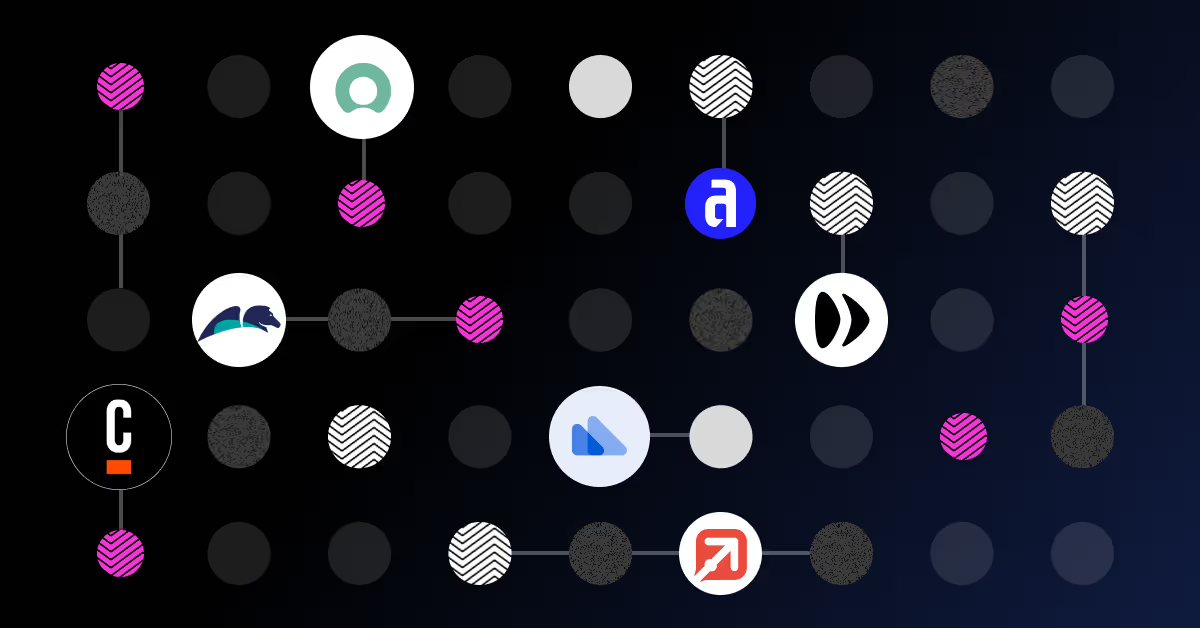What is process orchestration? (2026)

If you've landed on this blog, the chances are you're...
- Looking for help with running and managing operations
- Trying to wrap your head around this process orchestration malarkey
- Searching for answers to both quandaries
Process orchestration is a relatively new category, and as such, it has the potential to confuse people. Humans are naturally creatures of habit, so when a new term pops on the scene it can take some getting used to. Not to mention all the jargon out there. Luckily, we know a thing or two about process orchestration and have built our business around it.
In this blog, we'll break down exactly what process orchestration is, and the various ways it can help you manage operations without tearing your hair out. Spoiler alert: it's got absolutely nothing to do with musical orchestras.
What is process orchestration?
Process orchestration is the flow of all work in an operation between humans and digital teams. It enables end-to-end process design and management, helping businesses to streamline processes, neatly organize operations, assign the right tasks to the right resource, and complete SLAs on time.
Orchestration is a new category. Here's what you should know
As orchestration is relatively new, there is confusion around what it can solve. Some mistake it for a workflow tool like Monday or an AI tool like Pega, but it’s more holistic than that. It’s a solution that streamlines work, manages a hybrid workforce, and helps you to automates repetitive tasks to improve customer and employee satisfaction.

More education is needed as new players enter the market and businesses explore the benefits of orchestration.
What problems does orchestration address?
Visibility & autonomy
Orchestration provides an overview of workflows and metrics, giving ops and technology leaders the power to transform their business.
Missed SLAs
With orchestration, work is assigned to the right person (or bot) at the right time, in order of priority. As a result, businesses that implement orchestration are able to slash missed SLAs and deliver more consistent work, on time.
Resource capacity
Orchestration enables businesses to automate tasks, fix bottlenecks, and speed up processes to free up more resource capacity.
Accountability
No more wasted time figuring out who is doing what. Orchestration assigns the right work to the right employee and keeps all work and communications inside the platform to prevent errors.
The manual meltdown
Orchestration software integrates with automation providers to streamline and automate manual, repetitive tasks, addressing the 53% of employees who want to spend less time on manual tasks.
Who is process orchestration for?

Orchestration is designed for Operational Leaders who are dealing with large volumes of tickets, data and teams, and Innovation Leaders who are tasked with scaling transformation.
One of the most common complaints we hear from Chief Operating Officers is a lack of visibility in their operations. We hear this so often that Enate’s CEO, James Hall created a term for it: Operational Soup.
"Operational Soup is a term we use when work is being carried out, but businesses have little idea how much, by whom or exactly how it is processed."
What processes can orchestration help with?
Tonnes, as it turns out. Orchestration is most commonly adopted in the finance, banking, insurance and health industries, but any enterprise organisation that is handling large teams, processes and data could stand to benefit from orchestration. Some common use cases include:
- Ticketing and emails
- Claims processing
- Loan processing
- HR onboarding
- Underwriting
- Accounts payable
- KYC
- Insurance claims
What are the benefits of orchestration?
Return on Investment
Automation of repetitive tasks and process optimization can free up more resources and reduce errors.
Efficiency
Orchestration software can assign the right work to humans and digital workers, automate repetitive processes, and improve productivity by up to 20%.
Actionable insights
Orchestration can help identify productivity differences across teams and identify bottlenecks early on.
Customer success
Orchestration ensures work is completed on time, reducing missed SLAs and increasing client satisfaction by (an average of) 33%.
Employee satisfaction
Automating repetitive tasks with RPA can increase efficiency and employee satisfaction by allowing them to focus on more challenging work.
How to introduce process orchestration into your operations
Here are the steps we suggest you take when implementing process orchestration in your company.
- Assess your existing workflows
Scrutinise your current workflows from beginning to end. Consider each step carefully and identify any common problem areas that would most benefit from orchestration. This knowledge will inform your orchestration strategy going forward. - Select the right orchestration platform
The success or failure of process orchestration can rest on the platform you choose. Look for a solution that will integrate with your existing systems, allow you to map out workflows, provide valuable data, and help you identify areas for improvement and automation. - Identify automation opportunities
You’re looking for tasks that are repetitive and rule-based. These are the best processes to automate for greater efficiency, error reduction, and a more economical use of resources. - Prioritize data accessibility and security
Data is frequently stored in various different places by numerous different departments. This fractured situation is not good for either data accessibility or security. For orchestration to achieve its purpose, your data architecture must be unified, secure, and easily accessible on an orchestration platform. - Promote collaboration across teams
A process orchestration platform centralises communication and therefore supports collaboration. Provide all employees with the requisite training and make sure your orchestration platform is equally accessible remotely as it is in the office.
Example: Employee onboarding
When assessing existing workflows, many businesses will identify employee onboarding as an area greatly in need of process orchestration. It is often a laborious process, involving a lot of paperwork, manual procedures, and multiple systems.
Applying process orchestration here centralizes all onboarding tasks in one place. New starter paperwork can be digitised and automated, which both expedites the process and keeps sensitive employee information secure.
Where employee onboarding might previously have taken weeks to complete, the whole procedure can be done in a fraction of the time. New starters experience a better first impression of the business and can focus on getting settled in without the distraction of a pile of admin.
Businesses need better ways to manage the flow of work

We recently conducted a survey with Shared Services Link which examined post-pandemic work habits and methods of over 100 global businesses. As you can see from the data, the majority of employees are bogged down in manual work, struggling to cope with the volume, and missing SLA requirements as a consequence.
Orchestration removes these headaches. Everyone is able to work harmoniously using one simple platform, work is ordered by priority, and tedious, repetitive tasks can be automated leading to happier customers and happier employees.
What Operational Leaders say about orchestration
We asked Felipe Araya, Global Head of Operations at TMF to share his thoughts on orchestration.
Having orchestration implemented across our departments can be likened to having x-ray vision into your operations.
When asked what advice Felipe would give other businesses looking to implement orchestration, he said:
If you’re thinking about implementing orchestration software - stop thinking and do it. The process is difficult at first but eventually you’ll ask yourself ‘how did we manage without it?’
Also, don’t underestimate the power of analyzing data in your orchestration platform. Implementing the software is 50% of the work; analyzing and acting upon what the data is revealing is where the real improvement comes from.
What ROI can you expect to achieve with orchestration?
Operation Managers that use process orchestration solutions usually report a 15% increase in operational efficiency within 6 months. Discover how EY used process orchestration to get these results quickly, and rolled out orchestration to over 1000 staff.

Frequently Asked Questions about Process Orchestration
- What exactly is Process Orchestration?
Process Orchestration is the conductor of your business's symphony. It's the maestro that ensures every instrument - or in this case, task - is played at the right time and in harmony with the others. It's all about managing and coordinating work within an operation, from designing workflows to assigning tasks and making sure everything is completed within the set timeframe. - How does Process Orchestration differ from Workflow Management?
Think of Workflow Management as a single musician playing a piece, while Process Orchestration is the conductor overseeing the entire orchestra. Workflow Management handles individual tasks, while Process Orchestration gives you a bird's eye view of the entire operation, ensuring all tasks are coordinated and completed efficiently. - Can Process Orchestration be beneficial to all industries?
Absolutely! Any industry that juggles complex operations and a large volume of tasks can benefit from Process Orchestration. This includes sectors like finance, banking, insurance, healthcare, and many others. It's all about improving efficiency and productivity, no matter the field. - What are the key benefits of Process Orchestration?
Process Orchestration is like a productivity powerhouse. It leads to increased efficiency, improved resource allocation, better accountability, and a significant reduction in manual work. Plus, it can help automate repetitive tasks, freeing up your team to focus on more complex and rewarding tasks. - How does Process Orchestration improve customer satisfaction?
By ensuring tasks are completed efficiently and on time, Process Orchestration can lead to improved service delivery. This, in turn, can boost customer satisfaction. After all, a well-orchestrated operation often leads to a harmonious customer experience. Enate customers have improved SLA performance by 80% using our platform. - What role does automation play in Process Orchestration?
Automation is like the first violinist in the orchestra of Process Orchestration. It plays a key role in carrying out repetitive tasks, streamlining workflows, and ensuring tasks are completed within the stipulated time. It's all about making the process as smooth and efficient as possible. - Can Process Orchestration impact employee satisfaction?
Definitely! By automating repetitive tasks and ensuring efficient task management, Process Orchestration can help employees focus on more complex and fulfilling tasks. This can lead to increased job satisfaction. After all, a well-orchestrated operation is a happy operation.






